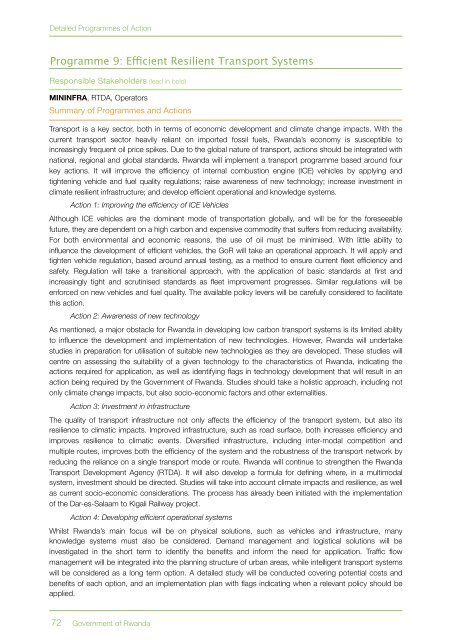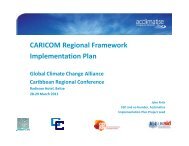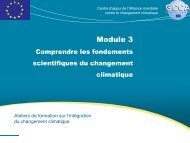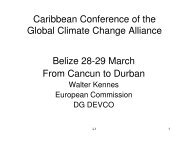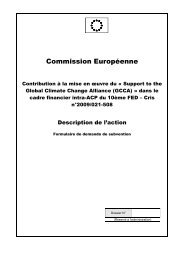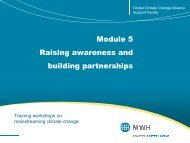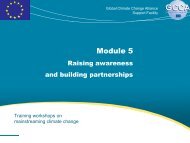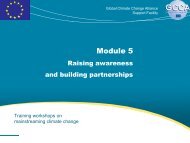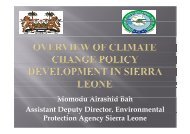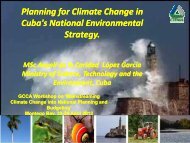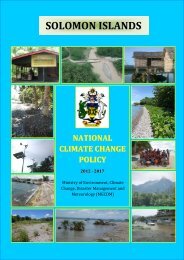Rwanda Green Growth Strategy 18nov11 - Global Climate Change ...
Rwanda Green Growth Strategy 18nov11 - Global Climate Change ...
Rwanda Green Growth Strategy 18nov11 - Global Climate Change ...
Create successful ePaper yourself
Turn your PDF publications into a flip-book with our unique Google optimized e-Paper software.
Detailed Programmes of ActionProgramme 9: Ecient Resilient Transport SystemsResponsible Stakeholders (lead in bold)MININFRA, RTDA, OperatorsSummary of Programmes and ActionsTransport is a key sector, both in terms of economic development and climate change impacts. With thecurrent transport sector heavily reliant on imported fossil fuels, <strong>Rwanda</strong>’s economy is susceptible toincreasingly frequent oil price spikes. Due to the global nature of transport, actions should be integrated withnational, regional and global standards. <strong>Rwanda</strong> will implement a transport programme based around fourkey actions. It will improve the efficiency of internal combustion engine (ICE) vehicles by applying andtightening vehicle and fuel quality regulations; raise awareness of new technology; increase investment inclimate resilient infrastructure; and develop efficient operational and knowledge systems. Action 1: Improving the efficiency of ICE VehiclesAlthough ICE vehicles are the dominant mode of transportation globally, and will be for the foreseeablefuture, they are dependent on a high carbon and expensive commodity that suffers from reducing availability.For both environmental and economic reasons, the use of oil must be minimised. With little ability toinfluence the development of efficient vehicles, the GoR will take an operational approach. It will apply andtighten vehicle regulation, based around annual testing, as a method to ensure current fleet efficiency andsafety. Regulation will take a transitional approach, with the application of basic standards at first andincreasingly tight and scrutinised standards as fleet improvement progresses. Similar regulations will beenforced on new vehicles and fuel quality. The available policy levers will be carefully considered to facilitatethis action. Action 2: Awareness of new technologyAs mentioned, a major obstacle for <strong>Rwanda</strong> in developing low carbon transport systems is its limited abilityto influence the development and implementation of new technologies. However, <strong>Rwanda</strong> will undertakestudies in preparation for utilisation of suitable new technologies as they are developed. These studies willcentre on assessing the suitability of a given technology to the characteristics of <strong>Rwanda</strong>, indicating theactions required for application, as well as identifying flags in technology development that will result in anaction being required by the Government of <strong>Rwanda</strong>. Studies should take a holistic approach, including notonly climate change impacts, but also socio-economic factors and other externalities. Action 3: Investment in infrastructureThe quality of transport infrastructure not only affects the efficiency of the transport system, but also itsresilience to climatic impacts. Improved infrastructure, such as road surface, both increases efficiency andimproves resilience to climatic events. Diversified infrastructure, including inter-modal competition andmultiple routes, improves both the efficiency of the system and the robustness of the transport network byreducing the reliance on a single transport mode or route. <strong>Rwanda</strong> will continue to strengthen the <strong>Rwanda</strong>Transport Development Agency (RTDA). It will also develop a formula for defining where, in a multimodalsystem, investment should be directed. Studies will take into account climate impacts and resilience, as wellas current socio-economic considerations. The process has already been initiated with the implementationof the Dar-es-Salaam to Kigali Railway project. Action 4: Developing efficient operational systemsWhilst <strong>Rwanda</strong>’s main focus will be on physical solutions, such as vehicles and infrastructure, manyknowledge systems must also be considered. Demand management and logistical solutions will beinvestigated in the short term to identify the benefits and inform the need for application. Traffic flowmanagement will be integrated into the planning structure of urban areas, while intelligent transport systemswill be considered as a long term option. A detailed study will be conducted covering potential costs andbenefits of each option, and an implementation plan with flags indicating when a relevant policy should beapplied.72Government of <strong>Rwanda</strong>


